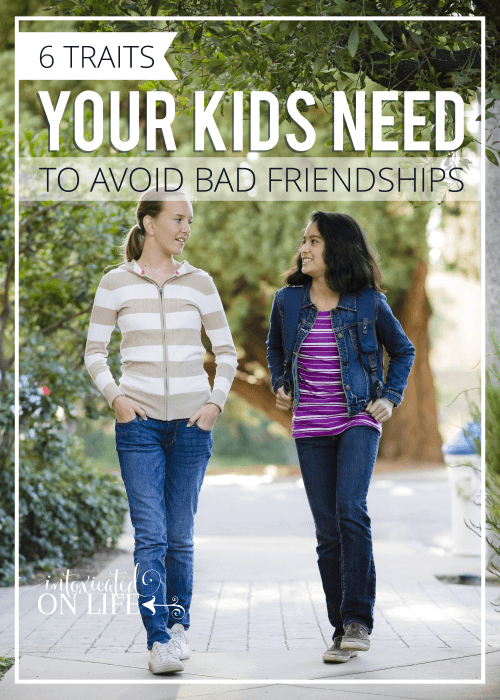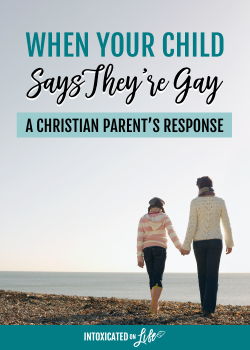I’m constantly amazed by the differences between my kids.
Their personalities, their preferences, their talents, and their tendencies can be as different as night and day.
This is certainly true in the realm of friendships.
- One or two of my kids have never known a stranger. They happily chat with the grocery clerk, the elderly neighbor they barely know, and even the bigger kid who was downright mean to them yesterday.
- On the other hand, one or two of my other kids really do like people (really, they do), but they have a hard time showing it. They are still learning that whacking friends in the head, calling them names, and taking their toys are not behaviors conducive to making friends.
- And then one or two of my kids like some people (but not most of them, truth be told) and aren’t really convinced that they need friends very much. They tend to be highly sensitive and easily offended, and they are generally unsure about how to make friends or how to be a friend.
Proverbs for Friends
Whether or not friendships come naturally to our kids, it’s important for us to teach them about healthy, biblical friendships. This means we need to consider with them what God has to say about friends and help them apply it to how they find good friends and how they become a good friend to others.
The wisdom of Proverbs is a great place to start, offering six principles for good friends.
1. Good friends are a good influence.
“Iron sharpens iron, and one man sharpens another.” (Proverbs 27:17)
“Whoever walks with the wise becomes wise, but the companion of fools will suffer harm.” (Proverbs 13:20)
Good friends are people with wisdom and integrity. They make good decisions in their own lives, and they influence others to do the same through their counsel and their example.
2. Good friends are loyal.
“A friend loves at all times, and a brother is born for adversity.” (Proverbs 17:17)
“Fair weather friends” aren’t really friends at all. Good friends will stick with us in good times and bad.
3. Good friends are invested.
“Oil and perfume make the heart glad, and the sweetness of a friend comes from his earnest counsel.” (Proverbs 27:9)
If we are being advised by someone in a way that reveals their sincere and intense concern for our well-being, we’ve found a good friend indeed!
4. Good friends are truthful.
“Faithful are the wounds of a friend; profuse are the kisses of an enemy.” (Proverbs 27:6)
While flattery can be appealing, it’s often deceptive (Psalm 12:2-3). True friends are always honest, even if that means sharing wise counsel or constructive criticism that’s in our best interest, even if we would rather not hear it at the time.
5. Good friends are empathetic.
“Whoever sings songs to a heavy heart is like one who takes off a garment on a cold day, and like vinegar on soda.” (Proverbs 25:20)
There are few things more precious than a friend who takes time to understand our heart, who rejoices with us and grieves with us, feeling our joy and our pain as their own and remaining by our side through it all.
6. Good friends are discreet.
“Whoever goes about slandering reveals secrets, but he who is trustworthy in spirit keeps a thing covered.” (Proverbs 11:13)
Trust can be difficult to earn and easily broken, but good friends know when to speak and when to remain silent. They can be counted on to never reveal a confidence.
What biblical qualities do you teach your kids about friendship? How do you help them foster healthy friendships with their peers?












I have been working with my daughter to teach her what makes a good friend. She is one of those “knows no stranger” types, and it can be difficult for her to decide who is worth spending her time with. I will definitely be looking up these verses with her.
I’m glad you found this helpful, Amanda!
I have two teenage daughters, and I think this list is perfect to share with them! I hope that they form lifelong friendships in the coming years, and they need wisdom to know what a true friend is. Thanks for sharing this list!
I honestly still have trouble making friends myself and am not sure the verses really help me understand how to do so.
Hi, Julie! Thanks for reading and for sharing part of your heart here. I can identify with what you’re saying – my personality tends to be on the reserved side, so I don’t make close friends easily either. But the focus of this particular post wasn’t making friends; rather, it was looking at what the Bible has to say about character traits of good friends. This is helpful for kids and adults as we exercise discernment about healthy, godly relationships. Maybe we’ll write a post in the future about how to make friends – thanks for that suggestion. 🙂
Hi … I have 2 teenage daughters that I’m struggling with at the moment like I’m gonna be honest Stealing my Aunts Car, wrecking it being on Prescriptions Drugs, Is now on Ankle Monitor, Running Away both my girls…. sometimes I feel as if I’m not a good Mother??? But as I’ve told then the saying goes “Birds of a Feather Flock Together”! Any suggestions???
Hi, Krystle, and thanks for your comment. I appreciate your willingness to share transparently about the situation with your daughters. I’m sorry to hear of the problems they’re creating both for themselves and for others. It must bring a lot of grief to your heart to see them walking this path.
I’m not a professional, so this isn’t professional advice, but I would encourage you to consider a couple of things. First, it’s likely that your daughters would benefit from some kind of counseling; sometimes teens accept guidance from other adults more easily than they do from their parents. I would urge you to seek this kind of counsel from your pastor or from a local Christian counselor. Second, it sounds as though law enforcement has become involved at some point. While this is something no parent would wish upon their children, having the authorities involved can be instrumental in getting a young person’s attention. Of course it’s not a decision to be made lightly, but bailing them out of trouble (either literally or figuratively) may only enable them to wreak more havoc and teach them that they can get away with criminal or immoral behavior. While it’s not easy for any parent, it’s often best to let kids experience the natural consequences of their decisions. Finally, I would encourage you to make sure you have a personal relationship with God (if you’re not sure what I mean by that, you might find this article helpful), so you can pray for your daughters. God isn’t a genie who can be manipulated to bend to our will, but He created us, He loves us, and He wants a relationship with us. He cares for you and your daughters, and He wants each of you to experience the abundant life available through His Son.
Please know of my prayers for you, that God would give you wisdom and strength, and also for your daughters’ eyes to be opened to the harm they’re causing and that they will turn toward the path that is best for them.